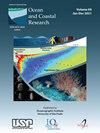Ocean Literacy, formal education, and governance: A diagnosis of Brazilian school curricula as a strategy to guide actions during the Ocean Decade and beyond
IF 1
4区 地球科学
Q3 MARINE & FRESHWATER BIOLOGY
引用次数: 8
Abstract
Ocean Literacy (OL) was proposed by UNESCO as a goal for the Decade of Ocean Science for Sustainable Development ( Ocean Decade ) aiming to (1) increase understanding of the importance of the ocean, (2) significantly influence communication on related subjects, and (3) facilitate informed and responsible decision-making about the ocean and its resources. Formal education is essential to expand the reach of OL, providing people with tools to engage in coastal and marine issues consciously and knowingly. To this end, content analysis of school curricula can help planning strategies, especially to empower citizens to implement public policies. This study assessed the extent to which OL-related terms and words are present in Brazilian curricular documents at federal (National Curriculum Parameters-PCNs and Common National Curriculum Base-BNCC) and regional (Federative Units curricular guidelines-RCs) levels. Qualitative (content analysis) and quantitative analyses (descriptive and non-parametric statistics, and multivariate analysis) were performed. The number of occurrences of OL-related words and terms were registered and counted. Nineteen words were found, totaling 797 citations (a frequency of 0.0001 in the total number of words referring to content). The number of citations were higher in BNCC-based RCs than in PCN-based RCs (Kruskal-Wallis test, p = 0.0009). Principal component analysis separated the documents into two groups, one related to BNCC-based RCs of Northeast, North and Midwest regions, with a higher number of OL related terms, and the other group with the PCN based RCs of these same regions plus those documents of Southeast and South regions (principal component 1 explaining 97.90% of the total variation and having 0.93 correlation with the total frequency of citations). General results indicated that Brazilian production on fields and themes related to OL is still concentrated in national journals, books, and booklets, thus with a limited impact. In same way although school curricula in Brazil have a larger number of topics on marine environments than do other countries, they showed heterogeneity among Federative Units, but generally with the topics still representing a very small fraction of Brazilian curricula. Thus, it is necessary to expand the contents related to the ocean and marine environments in curricula to provide students with basic knowledge about the importance and functions of these environments, as well as their conservation. Therefore, results here emphasize the need to implement OL to highlight the importance of knowledge of the oceans and enable citizens to discuss marine conservation policies and promote ocean sustainability. This study provided some strategies to increase OL海洋扫盲、正规教育和治理:对巴西学校课程作为海洋十年及以后行动指导战略的诊断
海洋素养(OL)是教科文组织提出的海洋科学促进可持续发展十年(海洋十年)的目标之一,旨在(1)增进对海洋重要性的了解,(2)显著影响有关主题的交流,(3)促进对海洋及其资源作出知情和负责任的决策。正规教育对于扩大OL的影响范围至关重要,为人们提供有意识和知情地参与沿海和海洋问题的工具。为此,学校课程的内容分析可以帮助规划战略,特别是赋予公民执行公共政策的能力。本研究评估了巴西联邦(国家课程参数- pcns和共同国家课程基础- bncc)和地区(联邦单位课程指南- rc)级别课程文件中与ol相关的术语和词汇的出现程度。进行定性(内容分析)和定量分析(描述性和非参数统计以及多变量分析)。记录和统计与ol相关的单词和术语的出现次数。共发现19个词,共计797次引用(涉及内容的总字数频率为0.0001)。基于bnc的RCs的被引次数高于基于pcn的RCs (Kruskal-Wallis检验,p = 0.0009)。主成分分析将文献分为两组,一组是东北、北部和中西部地区基于bnc的文献资料,OL相关词汇较多;另一组是这些地区基于PCN的文献资料加上东南和南部地区的文献资料(主成分1解释了总变异的97.90%,与总被引频次的相关系数为0.93)。总体结果表明,巴西在与OL有关的领域和主题方面的产出仍然集中在国家期刊、书籍和小册子上,因此影响有限。同样,虽然巴西的学校课程比其他国家有更多关于海洋环境的专题,但它们在联邦单位之间表现出异质性,但总的来说,这些专题仍然只占巴西课程的很小一部分。因此,有必要在课程中扩大与海洋和海洋环境有关的内容,使学生了解海洋环境的重要性和功能,以及保护海洋环境的基本知识。因此,这里的结果强调了实施OL的必要性,以突出海洋知识的重要性,并使公民能够讨论海洋保护政策,促进海洋的可持续性。本研究提供了一些提高OL的策略
本文章由计算机程序翻译,如有差异,请以英文原文为准。
求助全文
约1分钟内获得全文
求助全文

 求助内容:
求助内容: 应助结果提醒方式:
应助结果提醒方式:


